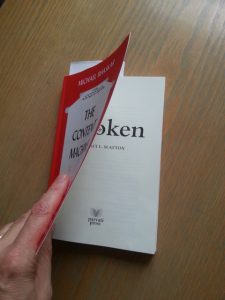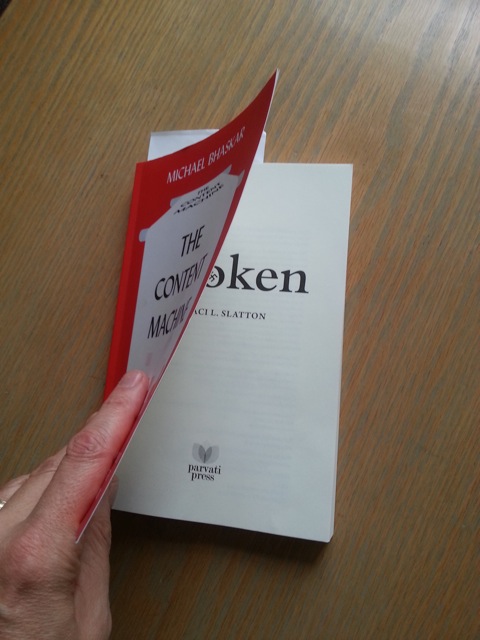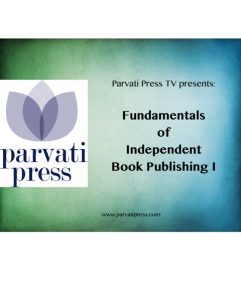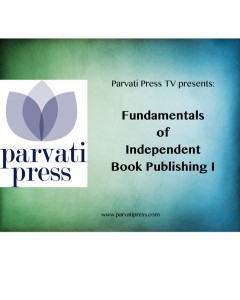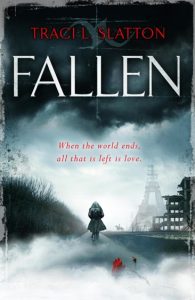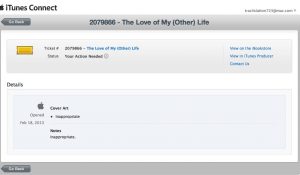The Business of Independent Publishing
Regarding the business of independent publishing: A few months ago, I received a polite email from Professor John Maxwell of Simon Fraser University. Some of his students had come to him. Between the covers of the text he had ordered for his graduate class on publishing, The Content Machine by Michael Bhaskar, was the novel Broken by Traci L. Slatton, in its entirety. He attached a picture to show me, see below.
Here was an opportunity to spread the word about Parvati Press in general and about my novels in particular, I thought. “Are your students interested in the novel? Would you like more copies?” I asked. I am always looking for opportunities to promote the Press.
He accepted with alacrity. Ten copies shipped out to him at SFU.
Sometime later, during an email exchange, he invited me to guest lecture to his class via Skype. I accepted. It was a good experience; his students were bright, polite, inquisitive, and thoughtful. I enjoyed talking to them but finished with a feeling of frustration: there was so much else to say about independent publishing.
Much of it I’ve learned the hard way, too.
It has been an intense journey since the day I decided to expand the Press and take on other authors. I’ve learned some tough lessons. My first time out of the box, I took on a writer who turned out to be certifiably insane. Not, like, a little kookie, but off-her-rockers lunatic demented. I’ve blogged about that elsewhere, including a Huffington Post article about How to Handle eMail Harassment.
The next three writers weren’t crazy, but I still made a big mistake in trusting one of them.
After the debacle with the first writer, I realized I needed a solid contract for dealing with potential Parvati Press authors. I hired an attorney who had helped me on other matters. She wasn’t a publishing attorney, and the contract put off the other writers.
That was my responsibility, I knew. So I went out and found a real publishing attorney, I mean, the guy in publishing law, to create a contract that was clear, simple, fair, and had precedents in publishing. He did a great job.
He also yelled at me about the deal I was giving the writers. He explained that I could not sustain the Press with that deal. He was right, but I felt that I had given my word to the writers, so those first few would still receive the deal I had originally offered them. He called me crazy. But I was going to keep my word.
One writer refused to do a revision that his manuscript urgently required. Line for line, his prose was polished and perfect. Unfortunately, it was a good story badly told. His novel was boring. He had to revise it to bring it to life. He didn’t want to do the work required because he’s had a storied career as an author. But production values matter to me, so I declined to send him a contract.
A second writer saw immediately that I was being scrupulously honorable. She signed the contract and sent it back immediately.
Ah, but the third guy. He had been hemming and hawing, wringing his hands, and dragging his feet about signing a contract from the day I sent him one. Days and weeks would go by. He was always about to talk to his attorney, who was so busy…. When I sent him the second contract, he said, “I’ll sign it right away, I’ll tell my lawyer that I want to get this done unless there’s something major wrong with it.”
As the months went by, with all the foot-dragging and hand-wringing and excuses, I was working on this writer’s manuscript. I stupidly invested a great deal of my own time, thought, and energy into his manuscript. Now, it had a germ of a good idea, and the writer showed flashes of serious, big talent throughout. But it was no where near publishable. It was going to require sustained heavy lifting to get it to the point where the manuscript was professional and polished.
Also, it was tricky to deal with the writer because of the arrogance involved. Taking editorial criticism is a skill that requires learning for most of us.
I paid for the Parvati Press editor to do a thorough manuscript critique. It was still going to be at least three more revisions before the manuscript was ready to be published, two that I could do and one more from the professional editor. Note that this editorial critique is the work product of Parvati Press.
Despite my honorable behavior, there was only continued hand-wringing and hawing and excuses about the second contract.
I woke up.
I realized–finally!–that this writer had no intention of signing a contract with me. One tip-off was when he asked why there was now no “out” in the new contract so he could go to a bigger publisher if one made an offer.
It broke over me that this writer was out to get free editing for his manuscript so he could shop it around to other publishers.
I conferred with several experienced business people close to me. One woman with her own PR company told me that it happens all the time. Clients come to her, get her ideas, and then don’t sign a contract and pay her. They go off and use her ideas either by themselves or with another PR firm.
Essentially, they rip her off, the same way that this writer planned to rip off Parvati Press.
Another businessman said to me, dryly, “Welcome to the business world.”
Another friend said, “These are the early business mistakes.”
My publishing attorney said, “Never work on a project without a signed contract.”
I emailed back to him, “I’m learning.”
This is just writer relations, a tiny slice of the whole juicy pie. There is so much else to independent publishing, especially the way I do it: with integrity. The book has to be high quality in terms of content, and it has to look good, too. It has to be copyedited, proofread, professionally laid out with an appealing, professionally designed book cover, and given an ISBN and accurate categories…And all that is BEFORE the hard work of marketing a book so it stands out from the crowd: so that readers will know about the book and buy it.
Marketing is a big challenge. It deserves its own post, so I’ll pause here. Meantime, here’s Professor Maxwell’s post about finding BROKEN in his textbook, called, cleverly, “My Content Machine is Broken.”
Maxwell is a good writer himself. His post is worth reading, though his characterization of my novel BROKEN is condescending and pejorative. I emailed him to let him know this:
I would like to put out there (please indulge me) that BROKEN is more than a paranormal romance. It is based on a serious philosophical question with which I wrestle every day: How could a good God allow such pain and suffering?In this vein, FOREWORD REVIEWS, which is the Library Journal for independent publishing, is reviewing BROKEN for its forthcoming Sci Fi issue, and wrote, “This is a gorgeous philosophical treaty on right and wrong….”
To his credit, Maxwell agreed with me. He has yet to correct his post to reflect the respect my novel deserves. And this is part of independent publishing, too: Making sure that independently published books are valued and respected.

